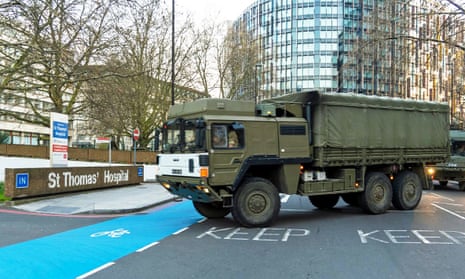Hospitals are being sent the wrong personal protective equipment to guard against Covid-19, forcing doctors and nurses to take time away from the frontline to get refitted and learn how to use it.
Hospital bosses have voiced frustration that they are receiving different sorts of face masks to the ones they usually use and for which they have been tested. The masks are vital protection for medical staff as they repel moisture droplets from infected patients.
Chris Hopson, the chief executive of NHS Providers, has highlighted the problem as a flaw in the government and NHS’s drive to tackle shortages of PPE among frontline staff.
On Twitter, he welcomed what NHS England has said is “millions more items of PPE” arriving in hospitals. However, he added that “[hospital] trust chief executives report that there are still some complications. For example, some report that they are getting deliveries of different brands of masks than they are used to and this requires each relevant clinician to do a time-consuming new mask fit test”.
Medics across the NHS are reporting the same problem, the Doctors’ Association UK (DAUK) said.
Dr Rinesh Parmar, DAUK’s chair, said: “We’ve been hearing from doctors across the country that they’ve been sent different masks. This is extremely worrying for doctors, who have been tested on one type and receive another.
“Testing is time-consuming and only available in the day. Doctors have written about their fears of coming in for a nightshift and being presented with a mask that they have not been tested on.”
Q&AHow can I protect myself and others from the coronavirus outbreak?
Show
The World Health Organization is recommending that people take simple precautions to reduce exposure to and transmission of the coronavirus, for which there is no specific cure or vaccine.
The UN agency advises people to:
- Frequently wash their hands with an alcohol-based hand rub or warm water and soap
- Cover their mouth and nose with a flexed elbow or tissue when sneezing or coughing
- Avoid close contact with anyone who has a fever or cough
- Seek early medical help if they have a fever, cough and difficulty breathing, and share their travel history with healthcare providers
- Advice about face masks varies. Wearing them while out and about may offer some protection against both spreading and catching the virus via coughs and sneezes, but it is not a cast-iron guarantee of protection
Many countries are now enforcing or recommending curfews or lockdowns. Check with your local authorities for up-to-date information about the situation in your area.
In the UK, NHS advice is that anyone with symptoms should stay at home for at least 7 days.
If you live with other people, they should stay at home for at least 14 days, to avoid spreading the infection outside the home.
Doctors have to undertake a “fit test”, lasting about 20 minutes, before they are able to use an FFP3 facemask, the type of mask the World Health Organization recommends staff treating Covid-19 positive patients use to reduce their risk of infection. However, many hospital doctors, GPs and nurses are angry and worried that there are major shortages of them.
Retraining takes already-busy doctors away from caring for patients, said Parmar.
One intensive care nurse at a hospital in Yorkshire told the Guardian how she had had to spend £100 of her own money to buy a full FFP3 respirator mask online. In her unit on Monday, there were no masks or surgical gowns, another vital piece of PPE kit which has also been in short supply. Some staff have resorted to making makeshift PPE , sometimes with clinical waste bags.
“Enormous stress is being caused by mixed messages from surgeons, anaesthetists and management on the nature of PPE required for different tasks and different patients,” the intensive care nurse added.
A nurse at a London hospital said: “I just came back from my night shift and it’s overwhelming with the lack of PPE and a lack of nurses.
“We are doing our best to do what we can, risking our lives. But we are all getting sick and I don’t see any of the retirees signed to come back. I don’t think they will be able to cope with the amount of jobs we are having to do now. We are all fit and younger but going down with this.”
Hopson also highlighted another issue. “Some stock [received by hospitals] has been relabelled with a later use by/expiration date. We are assured by national [NHS] leaders that this stock is definitely fit for use and has been robustly tested. But understandable why, without this explanation, PPE users might initially be concerned.”
NHS Providers, which represents hospital trusts, wants NHS leaders to clarify why Public Health England suddenly changed its advice two weeks ago on what PPE staff should use when treating patients suspected or confirmed to have coronavirus. Many frontline staff believe that that was to help mask the unavailability of the full PPE kit recommended by the WHO. They also suspect that trusts are hoarding their supplies for when the peak of the epidemic hits in a few weeks.
“Trust CEOs tell us they’re being asked by frontline staff about the reasons for the recent change in guidance and how it related to WHO/other countries’ guidance. We have therefore suggested to national leaders that they issue a clear statement on why guidance changed, why it’s adequate and explain reasons for any difference to other guidance,” Hopson tweeted.
